
views
Becoming an Actor

Move to Los Angeles. It is incredibly rare that someone gets a job acting from anywhere but Hollywood. You need to be available for an audition or interview at a moment’s notice or you will never become a paid actor. Make sure you have enough money saved to live comfortably until you find work – the average cost of living in LA is 50% then the rest of the country.

Take professional headshots. Headshots are high-quality pictures of you that studios use to decide if you are the right fit for a role. There are thousands of photo studios that offer headshots, usually costing anywhere from $200-$400. Make sure you tell the photographer that your headshots are for acting, as there are some other professions that require headshots in a different style. Your headshot should show off your brand, or how you want the industry to see you. Think about 3 words that describe you, like "upbeat, funny, and sporty," or "intelligent, quirky, and caring." Then, try to embody that through your wardrobe, expression, and pose.

Be an extra, or work as a crew member. Extras are the people in the background of movies and TV shows, and you can often grab a gig as an extra by simply showing up. Being an extra means you get to be on set, meeting people and learning how the film industry works, while still making some money acting. Bruce Willis, Brad Pitt, Megan Fox, and more famous actors all started out as extras and worked their way up from there. Any chance you get to be on a professional film set will help you make contacts that could lead to your next role.

Network with people on movie sets, at parties, and at work. Jenna Fischer, star of the hit show ‘’The Office,” got her first big role from a woman she met at a party. Years later, after proving she was a dependable actress in several plays and small TV roles, she was asked to audition for the role of Pam. Be kind to everyone you meet, and work hard on every role you get – you never know who is going to come through with your big chance. The more roles you take, no matter how small or weird, the more connections you will make with actors, directors, casting professionals, and agents.

Take acting classes. Hone your skills with professionals, but, more importantly, take the time to make connections. The people you take classes with are all in the same boat as you, and opportunities will arise for some people that can help you as well. Many now-famous comedy groups, like the Upright Citizen’s Brigade, began through friendships made at acting classes.

Register with SAG to get benefits, auditions, and certification. The Screen Actors Guild (SAG) is a union for actors. Many TV shows, films, and even commercials will only hire SAG-certified actors. While this does not have to be your first step in Hollywood, you should register online once you start getting your first auditions. Membership costs roughly $200 a year SAG members receive health benefits, acting workshops, online casting databases, and support when reading and signing contracts.

Go to as many auditions as you can. Auditions are your chance to shine, and they are posted online, in trade books, and in newspapers all over Hollywood. You should also continue asking your friends if they know of any good casting opportunities. Check online casting databases, like Backstage.com and SAGAFTRA.org, to get up-to-date casting information. Ask your agent, if you have one, to find auditions or parts for you. Always prepare for an audition by cleaning up, reading the part, and practicing your monologue or speech beforehand.

Get an agent once you start booking gigs. Agents specialize in landing roles for actors by communicating directly with studios about their needs. When a movie or TV show needs someone with a certain look or style, they ask the agent to provide them with a list of potential names instead of putting up a Craigslist ad. To get an agent, research acting agencies near you and send them a resume, cover letter, and headshots. Try to focus on agencies that specialize in actors whose brands are similar to yours, like Broadway or feature film actors. Try to use SAG/AFTRA (Screen Actors Guild-American Federation of Television and Radio Artists) approved agents, as they have been vetted by the industry and have proven connections. To find agents, search online for “acting agencies,” buy a “Call Sheet” book, which is a print collection of agents, or ask Hollywood friends if they can put in a good word for you. Apply to 10-15 agencies at a time, as they are often busy and may not even read your submission. Many will only accept actors who have already worked a few small gigs.

Start with small roles. As wonderful as it would be to rocket to stardom in your first picture, most actors work steadily for years before being noticed, if they get noticed at all. Do not let pride keep you from applying for small parts on TV shows, commercials, or the backgrounds of movies. Every role you land will help further your dreams as an actor. Commercials are an enormous market for actors and usually only require one day of work.

Try theater or stand-up comedy to get your name out there. Sometimes the best way to break into the film industry is to ignore it. Getting on stage is valuable experience that can get you noticed if the right person is in the audience. Ian McKellan, Alec Baldwin, and Sarah Jessica Parker all began their careers in theater. Stand-up comedians from David Cross to Amy Schumer spent years performing stand up before they broke into television.

Be patient while your career develops. Unfortunately, becoming an actor in Hollywood is a long journey that requires patience, hard work, and sacrifice. Some actors never make it out of commercials and small parts, but they continue because they love their work. Your big break can come at any time, but only if you’re working hard enough to make it possible.
Working on a Film/TV Set

Get a degree in Film or Film Production. While not necessary to succeed in Hollywood (directors like Steven Spielberg, Quentin Tarantino and James Cameron never went to film school), film school is a great place to learn the hard skills of film—camera settings, lenses, lighting, and sound design—while getting a chance to practice with professional equipment. Many cities have night classes in film at local art schools if you have already graduated. Film school can be expensive, but you'll learn a lot about how to create films, and it's a great way to make connections in the industry.
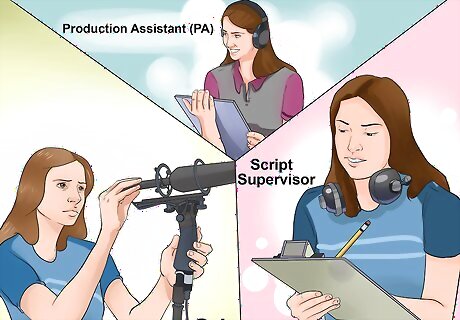
Start with an entry-level position, like production assistant or grip. Filming is an incredibly involved process that often takes over 100 people to get right. From makeup and costuming to sound engineering and cinematography, there are a lot of potential jobs in Hollywood behind the scenes. However, almost none of them will hire you without past experience. In almost every instance you have to start from the bottom to get the job you want. Some of the most common entry-level positions are: Production Assistant (PA): The PA does whatever the movie needs, from picking up actors or food to checking the script and rolling up cords. This is oftentimes the first job a burgeoning filmmaker takes because they get to work with many different film departments and meet many people, but it is thankless work. Grip: Holds boom microphones and sometimes cameras. This is a great job for someone interested in the audio side of Hollywood, but it is physically taxing to hold up equipment all day. Script Supervisor: Reads the script while filming to make sure there are no mistakes. Though this is not always considered an entry-level position, smaller studios will often hire a new person if they have experience in editing or writing.

Get an internship with a film studio. Internships are not just for college students and recent graduates—anyone can find a good internship with a little hard work. And though the job is often thankless, being in a studio each day teaches you about the industry and opens doors to better jobs later in life. Most major studios, like Lionsgate, Universal, NBC, and FX offer yearly internship programs on their websites. If you love the movies or TV a certain studio produces, check out “Employment” or “Jobs” on their website. Search Craiglist, InternMatch.com, and EntertainmentJobs.com for internships across Hollywood.

Do every single job to the best of your ability, no matter the task. Being a production assistant or intern is not easy. Most of your day is spent doing menial tasks or running errands, and it might feel like you are wasting your time. However, almost every single person working in Hollywood started from the bottom and worked their way up because they were dependable, respectful, and helpful. You must prove you can do the basic jobs on a film set before you are trusted with the creative jobs.
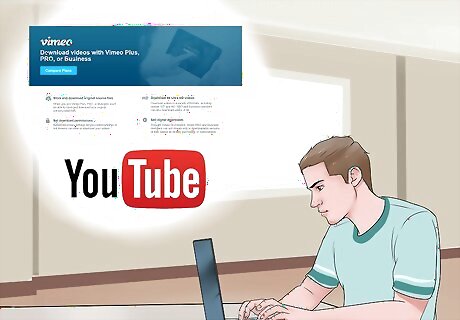
Make films in your free time. The best way to get experience is to take matters into your own hands. These days, the equipment needed to make a film is almost astonishingly cheap, as most smartphones can record HD video and sound right out of the box. Grab some friends, write a short script, and start filming today. Post your videos on Youtube, Vimeo, and Reddit to grab viewers online. Submit your movie to film festivals, like Austin Film Fest or Sundance, where film professionals might see it and ask for more work. This is how several famous writers/directors, like the Duplass brothers (Jeff Who Lives at Home, The League,) got started.
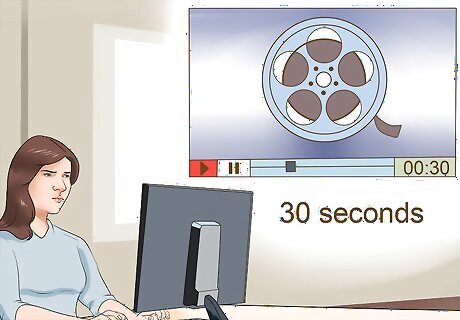
Put together a “demo reel” to send to potential employers. While a good smile and personality will help in an interview, most studios want to see some of your work before hiring you. A demo reel is a short compilation of your film accomplishments that you use to prove your skills. It should be no more than 2 minutes long and it should feature your very best work. Keep it short – you should grab their interest in the first 30 seconds. Tailor your reel to your job – if you are applying for a job editing, focus on scenes that cut between multiple angles, if you are focusing on sound design then focus on scenes that showcase how you mix music, dialogue, and sound effects seamlessly. Try to show a variety of work – if you can show 2-4 different projects successfully you prove that you can work on a variety of films.

Meet as many people as possible. Hollywood is a tight-knit community, and you never know when someone will offer you your big break. Working lots of different gigs, going to parties, and introducing yourself often will create a network of people around you that can lead to your next job. Work as many gigs as you can to gain experience and make new contacts. Always be respectful and helpful on set – you never know who might get a promotion and need your help later in life.
Writing in Hollywood

Learn how to format screenplays. Many studio executives and screenplay writers will throw your script out after the first sentence if it is improperly formatted. There are a variety of programs available online that will format your screenplay for you, from free programs like Celtx and WritersDuets to Final Draft, the industry standard. The type should be in 12pt Courier font. Always attach a title page to the front with your name and contact information in the bottom left corner.

Read screenplays from your favorite movies and shows. Reading screenplays is essential if you ever want to write them. A good screenplay must tell the entire story without any actors or cameras—it must paint a picture in the reader's head as if they were watching the movie at that very moment. This is an art form, and you can only learn it by reading the masters. Perform an internet search for “Title + Screenplay PDF.” While not every screenplay is online, a large number of them have been posted on various websites. Reading screenplays is a great way to learn formatting as well – if you see a scene a movie you like and don’t know how to format, like a montage or transition, read the screenplay to see how it is written out.

Write screenplays. The first question you will be asked in an interview is, “can we see your work?” Very few people in Hollywood are concerned with your degree or resume outside of writing – what they want to see is a fresh voice that is willing to write for a living. Once you’ve written one screenplay and it is as good as you can possibly imagine, sit down and write another. Try to write 3-4 pieces in the same genre (horror, comedy, drama, etc.) since most studios specialize in one type of film. If your first screenplay gets noticed, you then have 2-3 extra scripts the same studio might want.
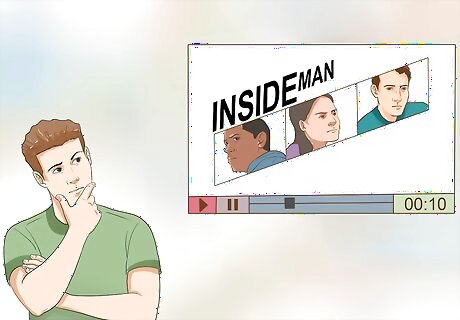
Learn how to craft log lines that sell your script. Log lines are short, 10-second summations of your film. Think of the brief explanations provided next to movies online and in the newspaper. You want to communicate, in general, the main character, the mood, and the plot in only one sentence, which is often harder than it looks. The best log-lines hook a person before they’ve even opened your script, and in the fast-paced world of Hollywood, you may only get 30 seconds to grab someone. ’’Inside Man:’’ A cop has to talk down a bank robber after the criminal’s perfect heist spirals into a hostage situation. ’’The Shawshank Redemption:’’ Two imprisoned men bond over a number of years, finding solace and eventual redemption through acts of common decency. ’’Forest Gump:’’ Forrest Gump, while not intelligent, has accidentally been present at many historic moments, but his true love, Jenny, eludes him.

Submit your screenplays to contests and festivals. There are hundreds of stories about unknown writers winning $10,000 and a trip to Hollywood after winning a big contest like the Austin Screenwriting Contest or Final Draft’s Big Break. More importantly, most contests offer feedback on your script, giving you advice on how to improve it from industry experts. This is especially crucial if you don’t live in L.A, as contests are a direct line to Hollywood if you win. Most contests cost between $35 - $100 to apply to, but they are cheaper the earlier you submit. Read reviews of contests before submitting to them to see if they are worth your money. Sites like MovieBytes.com offer reader reviews of each contest offered.

Become a writer’s assistant. Just like burgeoning directors must start as Production Assistants, a writer usually needs to start at the bottom before getting their own show or movie deal. Writer’s assistants answer phones, take notes, and run errands, but the important part of the job is making connections and lasting friendships. You never know when a writer will get a new gig and ask you to come along as a co-writer. Apply to writer’s assistant jobs on television and film studio websites, under “Employment.” Websites like Internmatch, EntertainmentJobs.com, and Craigslist often list posts for writing assistants.

Only pitch your scripts when asked. Time and time again, stories filter out of Hollywood about assistants, crew-members, and extras who are more concerned with their own writing than the project they are working on. This not only annoys your superiors but distracts you from doing your job. Work hard and do everything you can to help your project run smoothly and you will be promoted, noticed, and asked to share your ideas. However, when your chance arises to talk about your writing—take it!

Work as many film jobs as possible. Work on a crew, act as an extra, and write commercials if you have to. Every experience you get will teach you something and bring you one step closer to your dreams. Remember that every connection you make can turn into something important, so make as many connections as possible.


















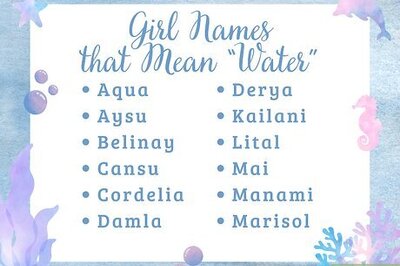
Comments
0 comment